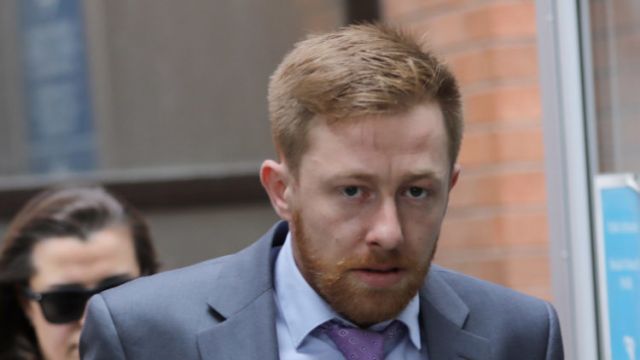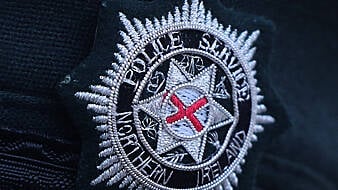After two trials lasting a combined 17 weeks over a two-year period, Gerard Cervi has been found guilty of murdering father-of-three Bobby Messett in a notorious shooting at Bray Boxing Club.
However Cervi (36), who has been in custody for over five years since his arrest, was acquitted by the Central Criminal Court jury of attempting to murder well-known coach Pete Taylor and a third man, Ian Britton, during the attack at the early morning gym class.
The defendant has no previous convictions and the prosecution did not elucidate a motive for the crime.
The jury of six men and six women took seven hours and 59 minutes over three days to unanimously accept the prosecution's case on the first count that Gerard Cervi was the gunman who fired nine shots into a crowded gym, killing Robert 'Bobby' Messett.
Mr Messett, a 50-year-old father of three, died from a single gunshot wound to the head.
The trial heard that a group of people had assembled at the boxing club in the early hours for a training session when a gunman appeared at the door and opened fire. Mr Taylor and Mr Britton were injured while Mr Messett died immediately at the scene.
Evidence
Prosecuting counsel had told the jury that CCTV evidence was sufficient to convict Cervi, but when added to the presence of his DNA and fingerprints in a Volkswagen Caddy van that the prosecution alleged was used by the gunman, it led to the "inevitable" conclusion that he was guilty.
The 12 jurors rejected the defence case that there wasn't an "iota" of evidence to identify Cervi as the gunman.
Cervi, from the East Wall area in Dublin 3, had pleaded not guilty to murdering Robert 'Bobby' Messett at Bray Boxing Club, Bray Harbour, Co Wicklow, on June 5th, 2018. He also pleaded not guilty to the attempted murders of Mr Taylor and Ian Britton on the same date and at the same location.
A sentence hearing for the defendant will take place on December 1st, when Ms Justice O'Connor will hand down the mandatory sentence of life imprisonment to Cervi. She remanded him in custody until that date.
On that date, the Messett family will have an opportunity to make a statement to the court about the impact Robert's death has had on their lives.
Before the courtroom emptied for the evening, Ms Justice O'Connor said she wanted to take the opportunity to offer her condolences to Mr Messett's family.
She added: "You have displayed enormous dignity at all times during the course of the trial. In my opinion, by your dignity you honour your beloved Mr 'Bobby' Messett. I cannot imagine your grief or imagine your pain but you certainly represented him with extraordinary dignity".
Continuing to address the Messett family, the judge said that to lose a loved one is always painful but she could not imagine the grief and pain of losing such a person in these circumstances.
In his direct evidence to Cervi's first trial in 2021, Ian Britton told the jury that the gunman had moved the weapon towards Mr Messett before he shot.
Shock
Mr Britton described how he was "in shock" as he grabbed his brother Matt onto the floor during the shooting and pulled his leg up to protect himself. He said he then felt "a fierce pain" in his hip area and down his right side.
At Cervi's second trial, Pete Taylor explained how he made a run toward the gunman but failed to see a bench that caught his leg. "When I was diving over it, the bench caught my leg, and then I got shot and that spun me around," said Mr Taylor.
Prosecuting counsel Mr Murray said the effect on Mr Taylor's body angle "when he tripped or fell" appeared to have saved him from more serious injury "if not death".
In relation to the attempted murder charge, Mr Murray had told the jury the State must prove that the accused intended to kill.
Shortly before lunchtime on Friday in response to a question handed up by the forewoman of the jury, Ms Justice O'Connor told them that in order for the offence of attempted murder to be made out on count two and three, there must have been an intention to kill Mr Taylor and Mr Britton.
"You must be satisfied beyond a reasonable doubt that the requisite intent was on the part of Mr Cervi. He must have taken some step or action which was sufficiently proximate or close to what would have occurred," she said.
"Intention can be formed instantaneously, it can be formed in a second," she said.
Previous Trials
Between March and December 2022, Cervi's second trial dealt with lengthy pre-trial legal issues.
Last May, Cervi applied to the Court of Appeal for bail on the grounds that he had been in custody for years with no date for his second trial in sight.
Court of Appeal President Mr Justice George Birmingham said that if there were a clear timeline regarding the trial, bail would have been refused, but because there was not, the court was persuaded to contemplate bail.
Mr Justice Birmingham said that if there were a clear timeline regarding the trial, bail would have been refused, but because there was not, the court was persuaded to contemplate bail.
However, Cervi was to remain in custody as a trial date beginning October 4th was secured. Mr Justice Birmingham said that the question of Cervi's bail had been one of the "most difficult appeals" the court had to consider, with the court having considered granting bail on "possibly the strictest conditions ever imposed by an Irish court upon a person".
Cervi's first trial, which opened on June 29, 2021 was originally due to finish that August but two jurors asked to be discharged when the finish date was extended to September. On August 24, the remaining ten jurors further agreed to sit on until October 22nd.
However, on September 6th that year, the trial collapsed after another of the remaining jurors fell seriously ill. Trial judge Mr Justice Michael White said it was impossible to continue with the matter as the panel had gone below ten jurors.
He had also previously apologised to the jury for the "very bad underestimation" of how long the trial would take.
The jury had been absent for much of the first trial as lawyers argued over the admissibility of evidence.
Following the collapse of Cervi's first trial, the judge overseeing the Central Criminal Court lists warned barristers that they must tell the court in advance of any issues that are likely to cause delay in a trial.
Mr Justice Paul McDermott said if barristers expected a trial to last more than three weeks, they must submit the reasons in writing to the court. Trials listed for more than three weeks would not get a trial date, he said, unless the court received a written memo explaining the issues in the case and the length of time required to hear those issues.
In future, he said, "it will not be tolerated to go much beyond the estimate given".







